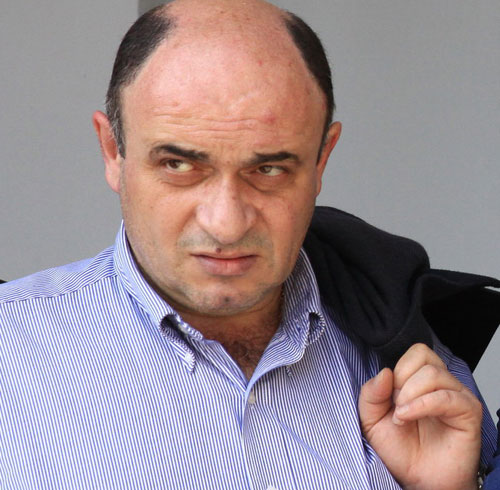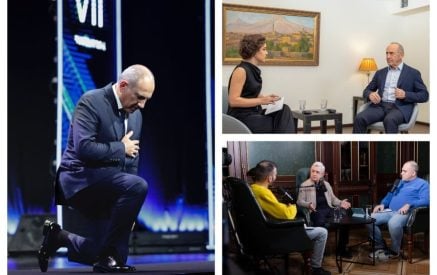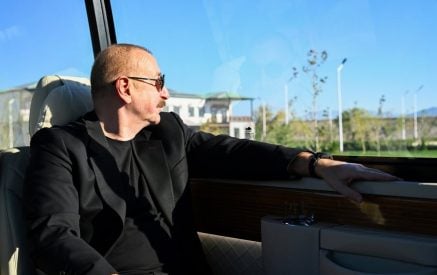Aghasi Yenokyan believes that “the three forces were not able to divide the pie.”
– On November 3, in Helsinki, Ambassador David Shahnazaryan and Eldar Namazov ANC adopted a joint statement on the Nagorno-Karabakh peace process. The authors of the Statement appealed to the leadership of co-chairs of the OSCE Minsk Group and to all States with urgent demand to stop the supply of all kinds of offensive weapons in the region of Nagorno-Karabakh conflict. We appeal to the political leadership of the parties to the conflict to urgently start a formulation of a Peace Agreement of Nagorno-Karabakh conflict on the basis of the initiative of the co-chair of the OSCE Minsk Group Ambassador James Warlick from May 7, 2014 and the Statement of the OSCE Minsk Group co-chairs from May 12, 2014. This statement was supported by representatives of civil society from both countries. Your organization, the Armenian Center for International and Political Studies, also joined the statement. How do you assess it, especially under the current domestic political situation in Azerbaijan, which obviously is anti-Armenian?
– The Helsinki Declaration has two key significance. First, to awaken the discussion of the Karabakh issue in the expertise and broad public circles. Otherwise, it leaves the impression that a consensus or indifferent situation has been created in Armenia, where no one is interested in this matter. In fact, there are no debates over the Karabakh issue, despite the fact that the presidents of the two countries have already met three times during this year. It is an unprecedented activity. Afterwards, to restore the discussion of the Karabakh issue with the Azerbaijani experts and civil activists, which now is in a poor situation. Azerbaijan is in a very difficult situation. There are pressures and arrests over the activists in Azerbaijan working with Armenians. The Helsinki declaration is also important in this regard. Not much was added to the document, in fact, it was a repeat of the Minsk Group Co-Chairs’ suggestion, which was mainly agreed by the authorities of Armenia. There were also issue regarding withdrawal of the snipers and other issues. I think that creating a broad consolidation around this document, and developing more in-depth expertise documents regarding all mentioned elements would be of great importance for the societies and civil societies of Armenia and Azerbaijan.
– What was the reaction to this initiative in Armenia and Azerbaijan?
Read also
– The anti-reaction in Azerbaijan was quite active. Back in Helsinki, we could notice a lot of criticism, even in semi-official form, about how it happened that after so many pressures some people have gone for cooperation with non-governmental organizations of Armenia. There were also quite negative reactions in Armenia, mostly by the non-governmental parliamentary trio. The media standing close to this Trio shed semi-abusive and semi-swaggering statements. In fact, the foreign political approaches of Armenia’s non-governmental groups and Aliyev’s surrounding are the same, both are criticizing this document. In addition, they did not contain any contextual reference, just personal offense. No word about contextual amendments in the document. Such an approach by political forces of Armenia is pitiful.
– In these days, however, the proposal of the “Heritage” party on recognition of Nagorno-Karabakh was once again discussed. Again, the opinions in the Parliament clashed. According to you, was this move ahead of time, or it is the right time for Armenia to recognize Artsakh?
– I understand that the recognition of Artsakh by Armenia would mean the end of negotiations on the issue of Artsakh. In other words, after it there would be nothing left to discuss and negotiate. The next argument for the sides would be the war. Recognizing Artsakh, we must be prepared for war the next day.
– To the point, about the parliamentary trio. How do you assess the recent domestic political events and the activities of the parliamentary Trio?
– I do not understand anymore, is it a non-government or an opposition Trio? As we had already said, the parliamentary Trio cannot have a common objective, each one in the Trio is trying to drag this group to its direction, like in the Krylov’s famous parable. In this respect, the Trio, I think, is mainly engaged in domestic discussion, trying to resolve some domestic issues. What was announced in advance, the 12 elements and the constitutional reform, we saw in the rallies that they are not discussed. They have set a task to change the regime, and no matter it was said that they are keeping the tactics in secret, but it seems there is neither tactics, nor substantiations about the reasons of the change of regime. This government is a very bad one and it should leave, but whether the one coming will be better. These are questions, without answering to them, I think, there would be no serious opposition movement in Armenia. Now, we witnessed that these forces were not able to divide the pie in-between them and began to make public statements against each other. Yet, within the range of correctness, but this correctness contained blackmailing, pointing out each other’s place. I think that this cooperation specifically has no great prospects.
– Can we conclude from the ANC’s statement that they made a mistake about confederates, or they see a risk to become marginal, because the PAP in the Trio is making decisions on its own? Did the bourgeois-democratic revolution fail?
– It is a term of the 19th century and now it is out of use. I do not think that the ANC party was cooperating with PAP for making a bourgeois-democratic revolution. Each one had its own problem to solve. The PAP’s problem was by using the still left opposition image of the ANC to somehow clear up its face from “March 1” and the oligarchic impressions about the PAP party. The “March 1” shooter already allied with him, at whom it has shot, is allied with a force that is always speaking against the oligarchy. ANC also wants to use the PAP party’s resources for its survival. Perhaps, time has come that there are some controversies in these problems.
Interviewed by Nelly GRIGORYAN























































